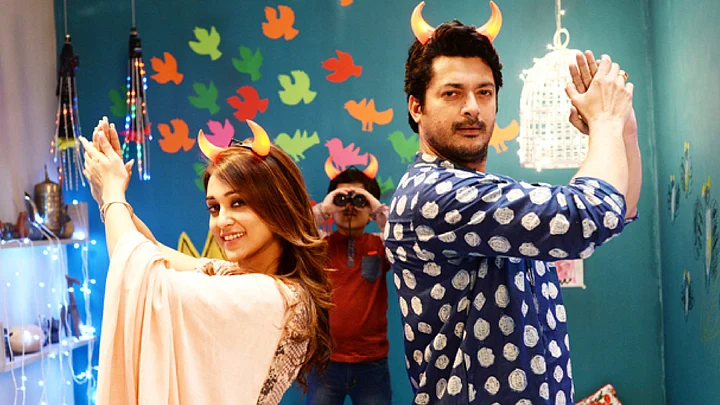‘Posto’ is a funny word. It’s rather fun to say, if you squeeze your lips into two consecutive ‘o’s – something much of the India that does not speak Bengali will find pliable. For the true-blue Bengali though, ‘Posto’ (while also very fun to say) is a word to evoke reams of memories. Think aloo posto. A classic Bengali dish. Mounds of semi-mashed potatoes mixed with poppy seeds (posto), eaten with rolls of rice and lip-smacking relish. Posto is characteristic of the Bangali and their Bangaliyana (the ‘aura’ that makes you a Bangali). Posto the movie, too, is the strongest example of current-day Bangaliyana.
Is One Kind of Bengali Better Than the Other?
What makes a Bengali? The film asks pointedly, hitting a raw nerve here, a raw nerve there, with carefully thought-out precision. Is it Shantiniketan – home to (Kabiguru to Bengalis) Rabindranath Tagore’s erstwhile school, plush with nature, its quiet evenings shaken only by the sounds of sonorous Rabindrasangeet sung by hundreds of little boys and girls? Or is it Calcutta – home to the ‘modern’ Bengali, dropping your kid off at a carefully selected creche, awaiting your promotion, buying kitschy home décor for a south Calcutta flat? Is one way better than the other? Is one way of living right and the other, indubitably, wrong?
Posto answers all these questions, and manages to do so without inciting a particular ‘side’ to anger. I know, because I watched with two generations – my grandmother and my parents, all three avid followers of the city’s cinematic scene. I know, because over the years of living away from the hub of Bengali cinema, the movies that I have watched on recommendations from friends, family and the city’s ‘bioscope’ sections have managed to surprise, thrill and please.
Take Posto, for example. A married couple (played by Mimi Chakraborty and Jisshu Sengupta) place their child in the custody of the man’s parents in Shantiniketan as they are hardly able to sustain themselves during the time of the child’s birth. The child grows up happily in the shelter of his grandmother who he calls ‘Maa’ and his grandfather who he calls ‘guruji’ – a veiled reference to all singing masters the innocuous Bengali child (me included) since time immemorial has grown up under.
When the child – whose name is Posto, by the way – turns seven, the parents decide to take him away because the father (who until then, had been a sort of a vagabond on the job market) finally lands a possible gig in the UK. The mother, who’s been working for the two of them until then, wants to ensure he does something for himself, and therefore, requests her in-laws to grant their child back to them.
No, It Isn’t Cool to Resent the Working Mom
So far, so good. Until the patriarch (played by the absolute veteran Soumitro Chattopadhyay) puts his foot down, refusing to hand over his grandchild to his own son, who he scorns as being a ‘little too free with the drink’. A powerful courtroom drama ensues and the wide-eyed Bengali audience member, at the end of the credit roll, exits wondering – “What makes a Bengali, after all?”
Here’s what was joyous in the movie – and why I am choosing to rejoice. How, overshadowed by its bigger brothers in tinsel town, the eastern hub of cinema is taking huge strides in making people uncomfortable, the right way.
Sample this. The mother who wants her child to live with her again, is never vilified for being a woman who let her child move away. She is never painted the antagonist – either through the narrative of the movie or unwitting cinematic lapses – for being the stable working force in the family, while her husband struggles to keep a job longer than 16 days.
Conversely, her husband doesn’t resent her either for holding her job while he is chastised by his father holding a drink – he never (unlike so many toxic relationships of the millennial age) takes it out on his wife. In conversations with his father too, and through several courtroom soliloquies, he manages to debunk the ‘mod (alcohol) is bad’ taboo that many a Bengali has protested – firmly underlining that there is a difference between a ‘modkhor’ (alcoholic) and a person who enjoys an occasional drink. Nor does he ever air any opinion – either to his wife or to another person – that he resents her being the one with the well-paying job, and not him.
Well done, there.
I watched as I thought of the many possibilities emerging out of this one. Of the jarring notes it will hopefully leave even in the most reluctant-to-budge-Bengali. Hopefully, he/she will pause just a second before they sniff at a drink and exclaim ‘Bish!’ (poison) – something I’ve heard many a relative do. Hopefully, they will let the working woman work, not with upturned noses, but with solidarity and not cry ‘noshto meye!’ (the spoilt woman). Hopefully, they will let a Bengali be, this way or the other, Shantiniketan or Calcutta, and not dub one to be ‘the better kind of Bangaliyana’.
(At The Quint, we question everything. Play an active role in shaping our journalism by becoming a member today.)
